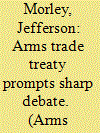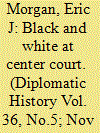| Srl | Item |
| 1 |
ID:
127862


|
|
|
|
|
| Publication |
2013.
|
| Summary/Abstract |
A senior State Department official last month defended the Arms Trade Treaty, signed by the U.S. government in September, after 50 senators wrote to President Barack Obama saying they would oppose the pact. In the Oct. 15 letter, the senators charged that the treaty undermines U.S. credibility, threatens the rights of gun owners, and impinges on U.S. sovereignty. The lawmakers said they "cannot give [their] advice and consent to this treaty" and "do not regard the U.S. as bound to uphold its object and purpose."
|
|
|
|
|
|
|
|
|
|
|
|
|
|
|
|
| 2 |
ID:
121169


|
|
|
|
|
| Publication |
2012.
|
| Summary/Abstract |
At a time when both the internal and global movements against apartheid in South Africa were at low ebb, African-American tennis star Arthur Ashe was successful in focusing the attention of the American public, the Nixon White House, and the international sporting community on South Africa. Ashe was also able to focus the attention of the South African government on the concerns of the anti-apartheid movement. Through his confrontation of apartheid, Ashe also underlined the anti-apartheid movement's struggle over how best to confront South Africa, through engagement or isolation. While Ashe strove to visit South Africa, other forces within the anti-apartheid movement championed boycotts and protests. These two competing visions led to much strife within the movement, and were an important component of the international debate over how to deal with apartheid and racial injustice in South Africa. Ashe traveled across several borders-both real and imagined-to emerge as a crucial transnational actor within the anti-apartheid movement in the early 1970s.
|
|
|
|
|
|
|
|
|
|
|
|
|
|
|
|
| 3 |
ID:
123698


|
|
|
|
|
| Publication |
2013.
|
| Summary/Abstract |
Model United Nations (MUN) is a simulation in which students take on the roles of ambassadors to the United Nations, engaging in debate on 'real' issues from the perspective of their assumed national identities. This paper, based on a year of ethnography and interviews of a college-level MUN team, examines the role of humour in producing particular geopolitical imaginations among those participating and also in producing the MUN assemblage itself. Key here is the circulation of affects among participants' bodies, producing an orientation among them that facilitates debate and consensus-building. This finding is seen as a corrective to past work on geopolitics and humour, which has tended to emphasise irony and satire, as well as mass-mediated humor.
|
|
|
|
|
|
|
|
|
|
|
|
|
|
|
|
| 4 |
ID:
126794


|
|
|
|
|
| Publication |
2013.
|
| Summary/Abstract |
Despite renewed interest in role theory and its promise to relate to agent-structure relationships, research in this area has underdeveloped notions of 'agency' and an incomplete understanding of the interaction between 'agency' and 'structure'. This problem can be attributed, in part, to the fact that the theory frequently overlooks the centrality of domestic political agents in the process of role conflict. An analysis of Danish decision-making over the country's involvement in Iraq and of Dutch decision-making over its involvement in Afghanistan illustrates the theoretical and empirical advantages of examining role conflicts with a focus on domestic politics. We conclude that studying role conflict as embedded in domestic political processes is important in the development of role theory in international relations research.
|
|
|
|
|
|
|
|
|
|
|
|
|
|
|
|